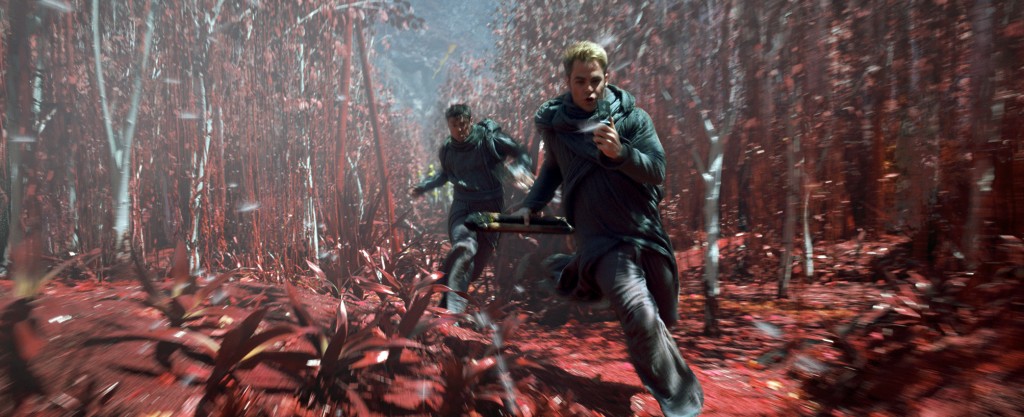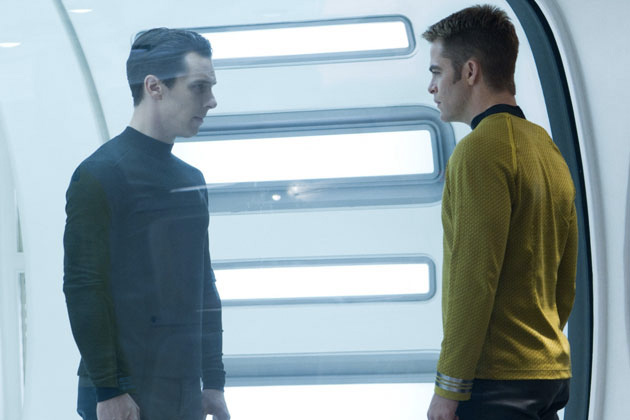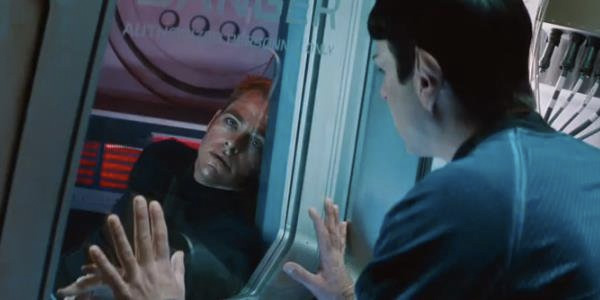
1. Sometimes It’s Okay to Break the Rules
The opening scene of this movie shows Captain Kirk and Dr. McCoy being chased away from an active volcano on an alien planet by hostile natives. Their mission was to surveil the planet, but upon realizing that the impending eruption of the volcano would actually destroy the planet, and all those living on it, plans changed.
As Commander Spock so logically reminds us, this is a violation of the Prime Directive, which states:
“No identification of self or mission. No interference with the social development of said planet. No references to space or the fact that there are other worlds or civilizations.”
So the rule states that they aren’t allowed to interfere, yet the right thing to do is to try and save these people. A question of morality. Obviously, Kirk and crew attempt and succeed in preventing the eruption of the volcano, but at the same time violate the Prime Directive. They did the right thing, but they broke the rules.
I must admit I am more like Spock than Captain Kirk in that I more often than not am a stickler for following the rules. However, in my experience I have encountered various circumstances in which the rules prevent me from doing the right thing.
There are times when it’s just not prudent to follow the rules. There are times when following the rules to the letter actually cause more harm than good. There are times when the rules need to be broken. Hence, prudence is a valuable virtue.
On multiple occasions Jesus points out that following the commandments, or the Law, is not what is really necessary. God gives us rules to follow, not so He can show His power over us, but so that we can live up to His plan, our potential, and be fully alive. The rules aren’t made for themselves, they are made to help us be who we were created to be.
Blindly following the rules doesn’t help any of us. Rules are put in place for our progress and protection, but it’s important to know and understand why a certain rule exists and why you should follow it.

2. People Should Be Treated Like People
The primary antagonist of the film, who actually switches sides a few times, skating on the fine line between friend and foe, is a genetically-enhanced, super-human space soldier named Kahn. He was created to win wars and is essentially a killing machine, yet he is also human.
Interesting that the biggest enemy of Star Fleet in this film is not an antagonistic alien race, but a human. What makes it worse is that he didn’t choose to wake up one day and go out on a massacre. He was messed with, tampered with, experimented on, “improved”.
In the film he seems like a normal guy at first glance, but his super-human abilities soon come to light and the way he is perceived by the Captain and his crew also changes. He is no longer one of them, not human, but something else.
If he would’ve been treated like a person, as a human in the first place, none of these problems would’ve arisen. It is the fault of Star Fleet for “creating” this monster. If his innate human dignity would’ve been respected and his genetics never altered or enhanced, than he would not be such a danger.
It is easy for me as a leader to get so focused on the task at hand or planning for the next one that I become less personable and begin to dehumanize people, treating the members of my team not as brothers and sisters, but as tools for my use. This utilitarian treatment is very dangerous and not only does it hurt them, but it hurts my team and even me.
When I stop and remember that every person on the planet is a creation of God, that He loves them and wants the best for them, just as He does me, everything changes. I can no longer treat them as an object to be used, but only as a member of my family, as a fellow child of God. His love for them challenges me to love them. Their dignity is restored.

3. There is Value in Sacrifice, Suffering, and the Gift of Self
The finale of Star Trek Into Darkness finds Captain Kirk crawling into the highly radioactive warp core of the starship Enterprise to realign it. He knows it’s the only way to save his crew, who he has put in danger numerous times, but he also knows that it will cost him his life.
Not only does Kirk want to make things right with his crew, he is also trying to make up for his failures. Either way, he knows he is not going to make it out alive. After climbing in and taking care of business he comes staggering out and collapses. Scotty and Spock look on as he takes his last breath.
Captain Kirk’s sacrifice of his own life, his being willing to endure pain and suffering, and the offering of his gift of self in turn saves the Enterprise and her crew. As Spock is always so keen of reminding us:
“The needs of the many outweigh the needs of the few.” ~ Commander Spock
I’ve been writing about suffering quite a bit lately, and for good reason. There is power in suffering, when we approach it not as punishment, but as an opportunity for growth. The Church Fathers and Early Christians knew this well.
“The blood of the martyrs is the seed of the Church.” ~ Tertullian
There is much to be gained through our sacrifice and suffering. And the gift of self is one of the few things that we don’t lose when we give it away.
A Good Movie with Good Morals
I must admit that I really like the treatment of common moral dilemmas in the film. If you haven’t watched it, check it out on Netflix and let me know what you think. These days it’s not very often that a Hollywood blockbuster be entertaining, suspenseful, action-packed and at the same time spiritually enriching and morally enlightening.
All photos copyright Paramount Pictures.